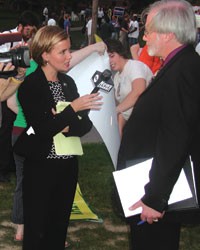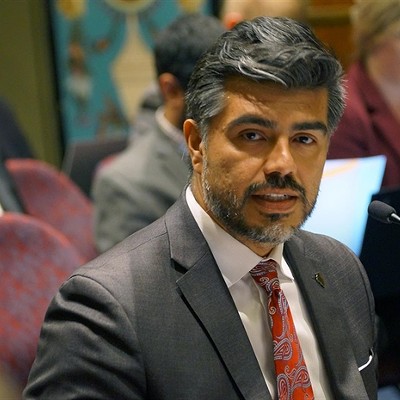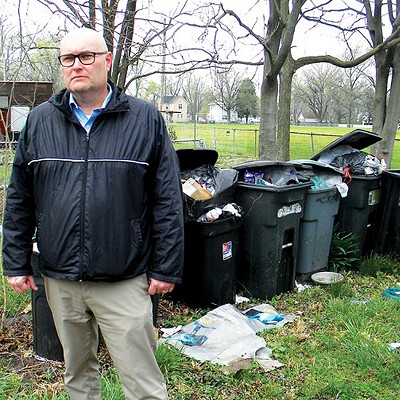At 10:15 p.m., in an empty auditorium, save for some university-relations staffers, audiovisual guys, and a handful of supporters, Rich Whitney, the Green Party candidate for Illinois governor, finally got his chance to speak.
On the same stage where major-party contenders Gov. Rod Blagojevich and state Treasurer Judy Baar Topinka had just wrapped up the first major gubernatorial debate of this election season, Whitney offered his responses to the same questions that were asked of his challengers.
Terry Martin, executive director of the Springfield-based Illinois Channel, facilitated.
The official explanation as to why Whitney couldn’t participate in the official debate, held Monday on the campus of Millikin University, in Decatur, was that the Illinois State Board of Elections hadn’t certified the Green Party’s petition until after plans for the event had been finalized.
Whitney, a civil-rights lawyer from Carbondale, doesn’t buy that argument, however.
“Frankly, I think what it really comes down to is, the other candidates did not want to debate someone who has better answers than they do,” he tells Martin.
“Whether we’re talking about the budget, health care, [or] clean energy, the Green Party and this campaign are the ones actually standing up for what the majority of the people want.”
Whitney agrees with Topinka and Blagojevich on the need for an electric-rate freeze, and he supports calls for a special session of the Legislature to enact such a measure before November’s election.
“We don’t have real competition, and as long as you don’t have real competition it doesn’t make any sense to deregulate,” Whitney says. “If you have a monopoly, it needs to be regulated.”
During the earlier debate, Topinka stated that with the recent conviction of ex-Gov. George Ryan on racketeering charges and Blagojevich’s administration reportedly under federal investigation, voters were suffering from “corruption fatigue.”
Whitney concurs.
“The problem goes beyond the individual; the problem goes to the system. It goes to a system in which corporations can give whatever contributions they like. There are no campaign-contribution limits in the state of Illinois. This is like the Wild West of buying and selling politicians,” he says.
On the issue of abortion, Whitney sides with the governor in opposing parental notification; Topinka favors notification.
As the only candidate from downstate — Blagojevich and Topinka are from the Chicago area — Whitney also weighed in on ethanol as an alternative fuel solution, saying, “Ethanol is not the magic bullet.”
Christopher Z. Mooney, a professor of political studies with the Institute of Government and Public Affairs at the University of Illinois at Springfield, says that, contrary to traditional thinking, Whitney may hurt Topinka just as much as he does Blagojevich, if not more.
“They’re both hurt by him, and the question is who’s hurt worse,” he says.
According to Mooney, Whitney gives disaffected Democrats a place to go other than Topinka. “On the other hand, you’ve got maybe some lefties that don’t want to vote for Blagojevich, so they see [Whitney] as an alternative, too,” he says.
The Green Party will run its first full slate in Illinois this year. Plans for a debate in Whitney’s hometown of Carbondale fell apart when organizers announced that Whitney, who has garnered as much as 7 percent of the vote in some polls, would be invited to participated.
A second has been scheduled for Oct. 26 in Chicago.
Contact R.L. Nave at [email protected]
















